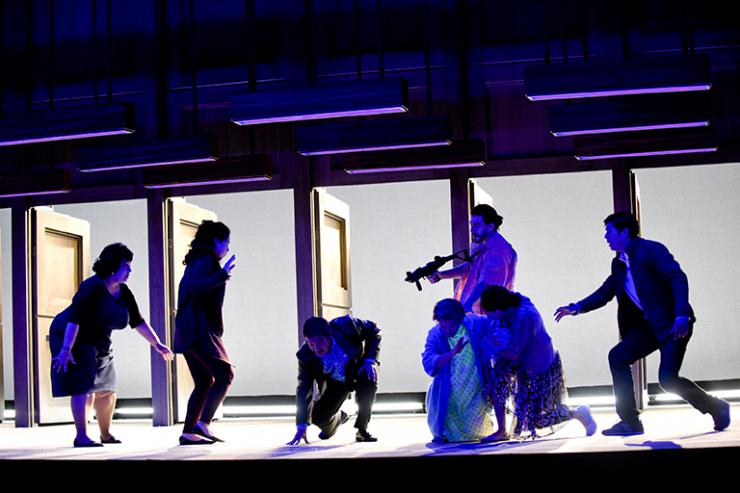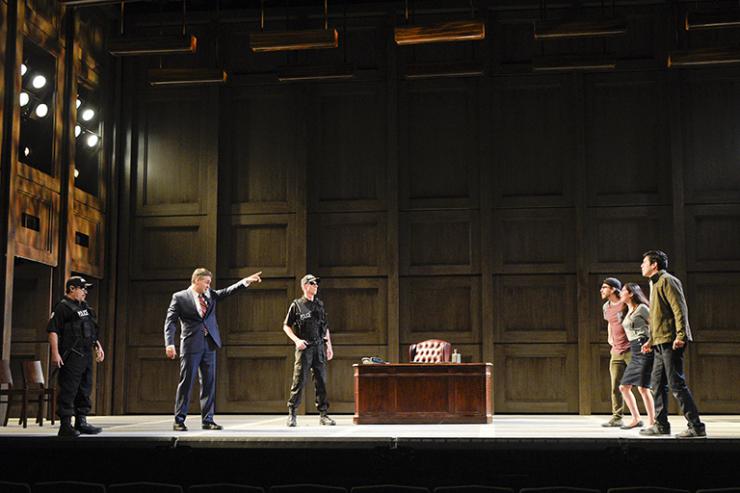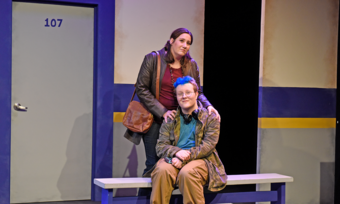Demanding Action and Attention to Latina/o Theatre in Dallas
Deferred Action by David Lozano and Lee Trull
“Why hasn’t Congress passed an immigration reform bill that would protect the DREAMers and their families?” This is the central premise of Deferred Action, a new play co-written by David Lozano (Artistic Director of Cara Mía Theatre Company) and Lee Trull (Director of New Play Development at the Dallas Theater Center). Deferred Action played at the Dallas Theater Center’s Wyly Theater from April 20-May 14 under the direction of David Lozano. Deferred Action is the second piece in a trilogy on immigration that Cara Mía began with The Dreamers: A Bloodline (2013), which tells the story of a mother fleeing El Salvador for the United States with her baby—a key part of Deferred Action’s plot.
Democrats. Republicans. Politicians. Activists. No one is left unscathed.

The collaboration between Dallas Theater Center (DTC) and Cara Mía began in 2009 when newly-minted DTC Artistic Director Kevin Moriarty attended Cara Mía’s production of Crystal City 1969, a company-devised play that dramatizes the Chicana/o civil rights movement in South Texas. Moriarty approached Lozano about both companies working on a new play that would continue Cara Mía’s work of staging Latina/o political history. This is the first collaboration between Dallas’s leading regional theatre and one of its leading Latina/o theatres, a unique collaboration that has involved Lozano and Trull co-writing the piece and a production that features actors from both theatre companies. Indeed, one of the most powerful parts of Deferred Action is seeing several Cara Mía company members make their DTC and major regional theatre debuts.
Speaking of this co-production, in Alexandra Bonfield’s review for American Theatre, Moriarty says,
With this project, we are attempting to rethink how a large, heavily resourced theatre can partner with a smaller, culturally specific company. We were committed to ensuring that the cast included an equal number of actors from both acting companies, and in roles of equal size and weight. It was important to us that the piece be directed by Cara Mia’s artistic director.
Indeed, this collaboration is a watershed moment for Latina/o theatre in Dallas and offers one potential model for regional theatres to implement in order to transform the way they program and engage with local audiences. Why shouldn’t there be more co-productions between large regional theatres and smaller culturally specific ones? How would the face of the American
Theatre change if seasons regularly featured full co-productions between The Public and the Puerto Rican Traveling Theatre/Pregones? Center Theatre Group and the Latino Theater Company? Arena Stage and GALA Hispanic Theatre? Steppenwolf Theatre Company and Teatro Vista?
Why shouldn’t there be more co-productions between large regional theatres and smaller culturally specific ones?
Typical of Cara Mía’s style of performing ethnographic research, Lozano and Trull invited local DREAMers and activists to participate in the play’s development by offering feedback while the play went through readings. The DREAMers are children who were brought to the United States, have been educated in this country, largely identity as “American,” yet face the threat of deportation to their country of birth. They grow up speaking English, attend school, work, pay taxes, but are still undocumented and denied the privileges of full citizenship.
In fact, Deferred Action’s protagonist Javier Mejía is based on actual leaders of the North Texas Dream Team. This story is extremely relevant to North Texas audiences. Only behind California, Texas is home to the second highest number of undocumented citizens in the United States. Texas has about 152,550people who quality for Deferred Action (73,260 have applied for the status as of 2013).
So what is Deferred Action?
Deferred Action is short for Deferred Action for Childhood Arrivals (DACA). This executive action grants a work permit and reprieve from deportation for young people who were brought to the United States under the age of sixteen and were not over the age of thirty-one as of June 2012. While DACA certainly has been fundamental to helping numerous young immigrants participate in society, there are still things that they will never have, such as a social security number or, as Javier notes in the play, the right to vote. DACA, therefore, grants many privileges and cultural citizenship, but nonetheless still relegates childhood arrivals to a second-tier status.
Deferred Action must be renewed every two years and, thus, does not result in citizenship or even legal residency. While President Obama passed an executive order to protect upwards of five million DREAMers in 2014, the 2016 presidential election could prove detrimental to this momentum. Obama’s executive order could disappear which would put many undocumented young people in danger of deportation to countries in which they were born, but that they potentially have never known.
Yet, DACA is not without its detractors. Texas’s Republican-majority government is part of a lawsuit comprised of fifteen states that aims to block Obama’s 2014 DACA expansion as well as initiatives that would give Deferred Action to parents (DAPA—Deferred Action for Parents of Americans). While these issues are still in court, many believe the Supreme Court will decide on the issue in June 2016. Admittedly, the play’s creative team acknowledged that at any moment it could go from a timely piece to a dated one, if, for example, comprehensive immigration reform were passed. In the Dallas Morning News, Lozano stated, “This was supposed to be a past-tense play, and yet here we are with politicians saying terrible things about immigrants and surging in popularity. It makes me angry.” But perhaps the fact that the play has such immediacy and remains relevant in a time of increased anti-immigration rhetoric from the right-wing and inaction from the left is where its power lies.
The timeliness of the political climate in which Deferred Action finds itself is fascinating and is where the play finds its dramatic tension.
The timeliness of the political climate in which Deferred Action finds itself is fascinating and is where the play finds its dramatic tension. The core group of DREAMers—Javi (Ivan Jasso), his fiancée Lisa (Elizabeth Ramos), Ximena (Stephanie Cleghorn Jasso), and Robby (Arturo Soria)—each have their own view on immigration reform. This diversity of opinion crosses party lines and creates a strain on the group. While Lisa favors Latina Democratic presidential candidate Nancy Rodriguez (Christie Vela), Javi becomes entangled with the Republican presidential candidate Dale Jenkins (Michael Brusasco). As a Latina, Nancy can’t base her campaign on immigration reform despite her desire to do so. As a white man, Jenkins can. After having a dream about a Salvadorian woman and her baby (the same character from Dreamers), Jenkins shifts his standpoint on immigration and quickly builds his entire presidential campaign on widespread immigration reform, destabilizing the Tea Party GOP to which he belongs.

The play begins with the curtain rising to reveal a woman clutching her baby to the sounds of machine gun fire. Fast forward to the present and the baby is our play’s protagonist, Javier Mejía who has become the face of the DREAMers and immigration reform after a run-in with the cops that his friend Robby filmed and posted to YouTube went viral.
The production is bold and full of action. Jasso immediately draws the audience in to his plight. His care for his grandmother, Abue (Frida Espinoza-Mueller) is clear, and her dedication to him is evident in her tough love and in the exposition which explains that she brought him to the US after his mother died. Their hearts have clearly been bound by a border crossing and that tie is felt throughout the production. Production choices echo the action demanded by the play. The lights and set rapidly change in scene transitions. While at times jarring, the bold transitions remind us of Javi’s predicament and his inner-turmoil, to be patient and hope for eventual change, or move with opportunity and essentially join the other side.
Brusasco plays Dale Jenkins, the Republican candidate, with conviction, inspiring a sense of hatred and fear elicited by recent political figures. While this may be exactly the point that Lozano and Trull are making, we were left wondering about the character Dale Jenkins, while Nancy Rodriguez is fully developed. Knowing more about his perspective would add more weight to Javi’s decision that ultimately drives forward the play’s climactic finale.
Deferred Action is a critical play to showcase in Dallas, where 42 percent of the population is Latina/o. Still left unearthed and ripe for investigation are questions about how the play is being received by season subscribers in this historically white theatre company’s space and also how the Latina/o theatre community is accessing the work there. The intervention and statement this play makes in a city that remains racially and economically segregated at a time when national and local politics seem to be more divisive than ever cannot be overstated. DTC and Cara Mia have taken action, and we hope others will follow their lead. The time is now.









Comments
The article is just the start of the conversation—we want to know what you think about this subject, too! HowlRound is a space for knowledge-sharing, and we welcome spirited, thoughtful, and on-topic dialogue. Find our full comments policy here
More on Deferred Action at www.theaterjones.com. TJ's chief editor, Mark Lowry has written extensively on the Dallas theater scene and particularly the Elevator Project, under which this collaboration took place. I reviewed the piece for them also.
Terrific article and a terrific collaboration between Cara Mia and Dallas Theatre Center. I want to point out that there are many examples of large, well-resourced theatres partnering with smaller, ethnically specific companies: e.g. The Public and Labyrinth, Goodman Theatre and Teatro Vista, etc. However, those partnerships tend to be the larger theatre hosting and providing resources to the small theatre. What's new here is the COLLABORATION on the development of a NEW piece--a collaboration that includes members of both companies working together towards the creation of a new production for their mutual community. Cara Mia and Dallas Theatre Center have forged an exciting, 21st c model.
Wonderful article. We need collaborations like this on subjects like this all over the country. So few know the truths about immigration and the effects it has on all our communities. The human face of immigration needs to be shared more and more.
Thanks for reading, @marissachibas:disqus!
Trevor and Alexandra,
Thank you both for this article. The collaborative effort between the DTC and Cara Mia on such a meaningful play is commendable and must be celebrated.
Thanks for the shout-out to my review. I'm available to write reviews, features. Prefer creative depth, social issues. .....this was a remarkable production of resonant collaboration.
Alexandra Bonifield
Great article. I liked hearing more about Deferred Action since the reading I saw last year. Great question and props for DTC and Cara Mia partnering together. I think that's a great model for other theater communities to widen the spread of their collective communities and audiences. I think they are on to something here. It was even great to read that the cast was divided by half Cara Mia and half DTC actors. I like that idea a lot.
@disqus_QjSZ7O1Fhh:disqus, it was really great to see how the show developed from the reading we saw last fall to the full production this spring. This is a timely play that needs to be seen across the country to do what theatre does best: start conversations and make change.